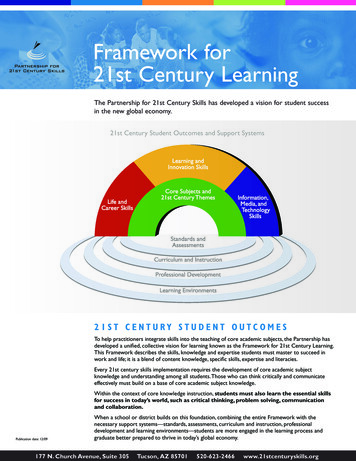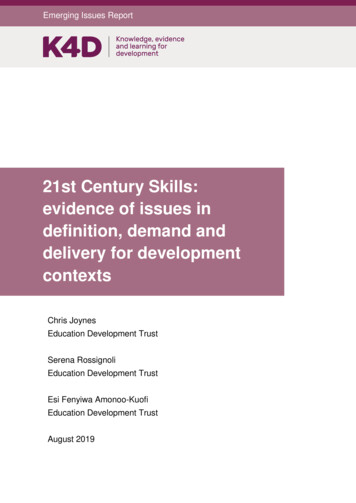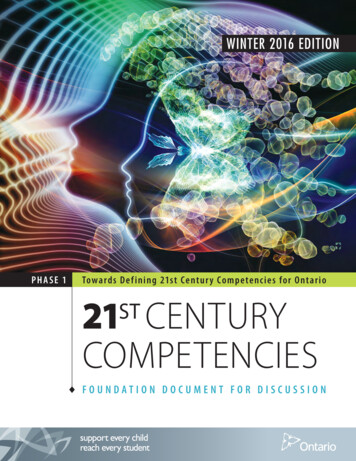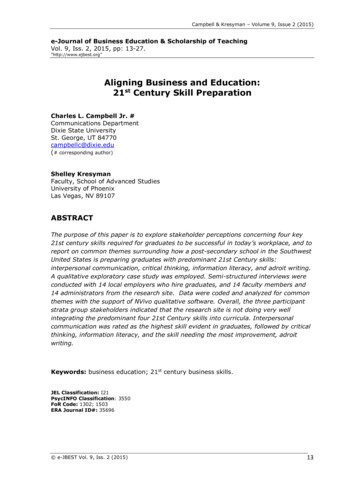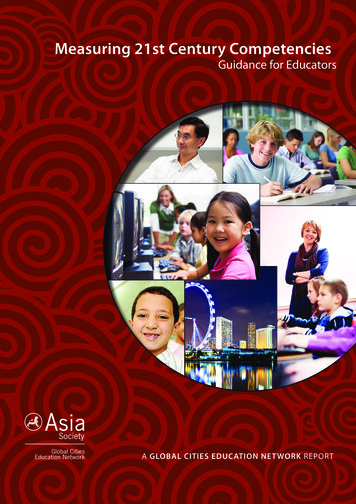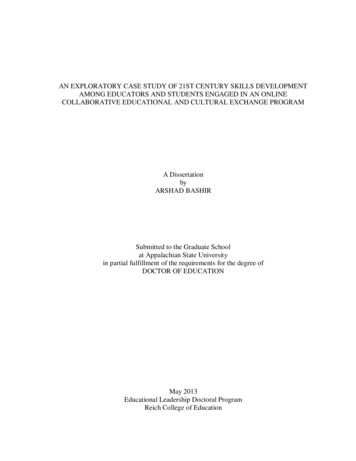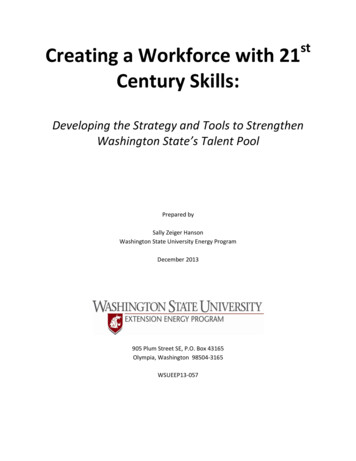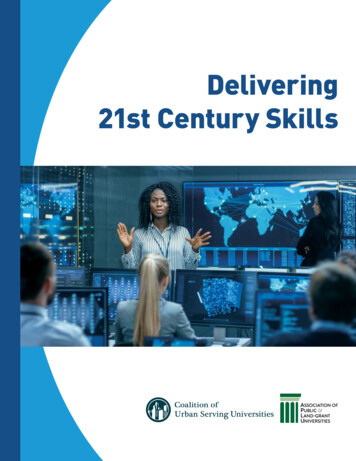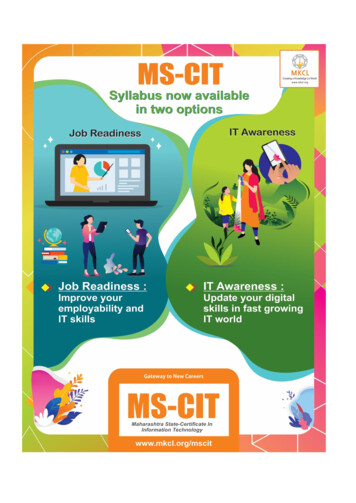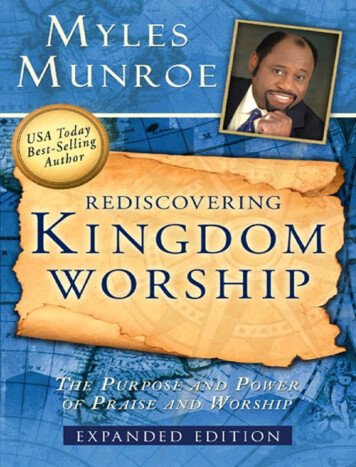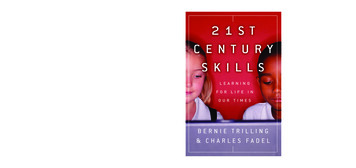
Transcription
Photo courtesy of Oracle Public RellationsPhoto copyright Charles FadelBERNIE TRILLING is global director forthe Oracle Education Foundation and theFoundation’s board member of the Partnership for 21st Century Skills. Prior to joiningOracle, Trilling was a director for the Technology in Education group at WestEd.Praise for 21st Century Skills“The authors have done nothing less than provide a bold framework for designinga 21st century approach to education, an approach aimed at preparing all of ourchildren to successfully meet the challenges of this brave, new world.”—PAUL REVILLE, Secretary of Education, Commonwealth of Massachusetts“Trilling and Fadel describe in very readable, practical terms how to infuse 21st century skills from standards all the way into the classroom. The DVD is full of wonderful ‘ah-ha’ moments to illustrate the possibilities. A terrific traveling companionfor educators, parents, and business and government decision makers concernedabout the future of our kids.”—PAIGE JOHNSON, 2009 Chair of the Partnership for 21st Century Skills;Global K–12 Manager, Intel Corporation“It’s about time that we have such an accessible and wise book about the 21st century skills that so many companies, policymakers, and educators are talking about.Trilling and Fadel distill insights from diverse communities of reflective inquiry onwhat redesigns of learning environments are needed to foster these skills, andprovide pathfinding tools for the exciting expeditions into the future of learning.”—ROY PEA, Stanford University, professor of education and the learning sciences“Trilling and Fadel lay out a comprehensive understanding of what is meant by 21stcentury skills. Read this book with a notepad—you’ll be jotting down ideas for howto use the information in your school district. A must-read for superintendents,curriculum directors, and teachers.”—ANNE L. BRYANT, executive director, National School Boards Association“Trilling and Fadel take the 21st century skills debate beyond rhetoric, providinga substantive, compelling, and engaging argument for the skills and competencies that our children need to succeed in a Knowledge Age economy. The skillsthey describe are the essential lifeblood of a productive, engaged, and intelligentcitizenry—this book is a must-read for skeptics and enthusiasts alike!”—MARGARET HONEY, president and CEO, New York Hall of ScienceEDUCATION 27.95 U.S. 33.95 CanadaCHARLES FADEL is global leader for education at Cisco Systems and the Cisco boardmember of the Partnership for 21st CenturySkills. Charles and Bernie also co-chair thePartnership’s Standards, Assessment andProfessional Development committee.Jacket design by Adrian MorganCover image courtesy of Gettywww.josseybass.com21st century skillsincludes a DVD with video mini-documentaries of innovative practices that bringthe skills to life and offer an exciting viewof what teaching and learning can and willlook like as we transform learning to meetthe demands of the 21st century.TRILLINGFADEL(Continued from front flap)21stcenturyskillsLEA R N INGFOROURLIF EI NTI MESTHE WORLD has undergone foundationalshifts in recent decades—widespreadadvances in technology and communications, booming economic developments andincreased competition, and the escalation ofglobal challenges from financial meltdownsto global warming. How can we prepare students to meet the challenges of our centuryif our schools remain virtually unchanged?This essential resource introduces aframework for 21st century learning thatmaps out the skills needed to survive andthrive in a complex and connected world.A 21st century education includes knowledge of traditional core subjects such asreading, writing, and arithmetic—but alsoemphasizes contemporary themes suchas global awareness and financial/economic, health, and environmental literacies.Students in 21st century schools will applytheir knowledge to understanding and solving real-world challenges using their 21stcentury skills:LEARNING AND INNOVATION SKILLS:Creativity and Innovation, Critical Thinkingand Problem Solving, and Communicationand CollaborationDIGITAL LITERACY SKILLS: InformationLiteracy, Media Literacy, and ICT LiteracyBERNIE TRILLING& CHARLES FADELCAREER AND LIFE SKILLS: Flexibility andAdaptability, Initiative and Self-Direction,Social and Cross-Cultural Skills, Productivity and Accountability, Leadership andResponsibilityThe book is filled with classroom vignettes,global examples, schoolwork samples, and(Continued on back flap)
ftoc.indd x7/30/09 10:13 AM
PRA ISE FOR21st Century Skills: Learning for Life in Our Times“Trilling and Fadel describe in very readable, practical terms how to infuse21st century skills from standards all the way into the classroom. The DVDis full of wonderful ‘ah-ha’ moments to illustrate the possibilities. A terrifictraveling companion for educators, parents, and business and governmentdecision makers concerned about the future of our kids.”—Paige Johnson, 2009 Chair of the Partnership for 21st Century Skills;Global K–12 Manager, Intel Corporation“Bernie Trilling and Charles Fadel have written a book that is truly visionary, providing sound insight into education in the 21st century. Their bookprovides solid, practical advice for educators, policymakers, business leaders, and others interested in improving America’s position in the globaleconomy. I recommend it to anyone interested in maximizing classroomeffectiveness in this digital age.”—Dr. Steven L. Paine, West Virginia Superintendent of Schools“A must-read for anyone interested in the ability of the United States to compete in a global economy. Educators, policymakers, business leaders, parents,and students will benefit from the comprehensive information on 21st century skills.”—Mary Ann Wolf, executive director, State Educational Technology DirectorsAssociation (SETDA)“Working, living, and learning in the 21st century will require an expandedset of skills, competencies, and flexibilities. We must prepare for a continuous learning and reskilling process throughout our lives and careers. This isa powerful exploration of what we collectively face as we live the future. Amust-read!”—Elliott Masie, CEO and chair, The Learning Consortium“Trilling and Fadel take the 21st century skills debate beyond rhetoric, providing a substantive, compelling, and engaging argument for the skills andcompetencies that our children need to succeed in a Knowledge Age economy.The skills they describe are the essential lifeblood of a productive, engaged,and intelligent citizenry—this book is a must-read for skeptics and enthusiasts alike!”—Margaret Honey, president and CEO, New York Hall of Scienceffirs.indd i7/30/09 10:18 AM
“Hooray to Bernie Trilling and Charles Fadel for demystifying 21st centuryskills. This book makes clear why education must change: to help preparestudents to meet complex challenges, fulfill their civic responsibilities, andlive fulfilling lives. Full of crisp descriptions, 21st Century Skills persuasivelyshows why policymakers and educators should run—not walk—to implement 21st century learning designs.”—John Wilson, executive director, National Education Association“With 21st Century Skills, Bernie Trilling and Charles Fadel have given us aglobal ‘search and replace’ for outdated educational thinking. Replace ‘scopeand sequence’ with the ‘21st Century Learning Framework,’ the P21 rainbow.”—Milton Chen, executive director, The George Lucas Educational Foundation“Charles and Bernie’s book cuts to the core challenge facing our country—isour education system preparing our children with the skills to succeed in a‘flat’ 21st century world? Much more than a treatise on what is wrong witheducation, they provide a compelling vision for education as it should beand a road map for getting where we need to go.”—Keith R. Krueger, CEO, Consortium for School Networking (CoSN)“This book presents an innovative, comprehensive strategy for evolving education to meet the needs of 21st century society.”—Chris Dede, Harvard School of Education“The authors have done nothing less than provide a bold framework fordesigning a 21st century approach to education, an approach aimed at preparing all of our children to successfully meet the challenges of this brave,new world.”—Paul Reville, Secretary of Education, Commonwealth of Massachusetts“It’s about time that we have such an accessible and wise book about the21st century skills that so many companies, policymakers, and educators aretalking about.”—Roy Pea, Stanford University, professor of education and the learningsciences“Trilling and Fadel lay out a comprehensive understanding of what is meantby 21st century skills. Read this book with a notepad—you’ll be jottingdown ideas for how to use the information in your school district. A mustread for superintendents, curriculum directors, and teachers.”—Anne L. Bryant, executive director, National School Boards Associationffirs.indd ii7/30/09 10:18 AM
“21st Century Skills is full of interesting examples illustrating both what workwill look like in the years ahead and how thoughtful educators are preparingchildren to thrive in tomorrow’s workplaces. The richness of the examplesreflects the authors’ extensive knowledge of how work is changing in thenation’s most innovative firms and their deep involvement in the efforts toimprove America’s schools.”—Richard J. Murnane, Thompson Professor of Education and Society,Harvard Graduate School of Education“Trilling and Fadel have captured powerful insight into critical 21st centurylearning skills. Life goes on and so must learning—this book is a must foranyone interested in the future of education.”—Allan Weis, Former IBM vice president, founder of ThinkQuest andAdvanced Network & Services“21st Century Skills provides specific recommendations for how we can—indeed must—change the curriculum, teaching, assessment, use of technology, and the organization of our schools to better prepare students to beproductive, creative citizens and workers in the global society and economyof the 21st century.”—Robert B. Kozma, Ph.D., emeritus director, Center for Technology inLearning, SRI International“Bernie and Charles have presented a well-researched and futuristic framework for changing how we teach and learn for the 21st century. It will be upto all of us to accept this challenge and move our country and world intoand beyond the 21st century.”—Kathy Hurley, senior vice president, Pearson K–12 Solutions and PearsonFoundation; Incoming Chair, The Partnership for 21st Century Skills“This is a well-written and referenced road map for the complicated andinterconnected collection of skills, knowledge, and attitudes that are essential for citizens to master in our increasingly complex and rapidly changingtechnological society.”—John E. Abele, Founding Chairman of the Board, Boston Scientific“Inspirational and motivational, this book is a practical guide to implementing and understanding 21st century skills. Every teacher and parent shouldread it so they can prepare their children and their students to solve theproblems of tomorrow, today.”—Dr. Barbara “Bobbi” Kurshan, executive director, Currikiffirs.indd iii7/30/09 10:18 AM
“After all the talk about organizing education, this book leads us back to whateducation is for. 21st Century Skills is a comprehensive and elegant survey ofour changing world, the skills it requires, and how those skills can be taughtand learned. Here is a blueprint for 21st century schooling.”—Michael Stevenson, vice president, Global Education, Cisco“This book presents an excellent case and road map for K–12 schools, forbalancing content knowledge delivery with the development of necessaryskills for success. It can serve as a valuable guide for parents, educators, andpolicymakers.”—Ioannis Miaoulis, Ph.D., president and director, Museum of Science, Boston“For anyone who cares about the future of our children and their success in aglobal economy, 21st Century Skills is required reading.”—Gerald Chertavian, chairman, Massachusetts Board of Elementary andSecondary Education’s 21st Century Skills Task Force; founder and CEO,YearUp“Bernie Trilling and Charles Fadel have been two of the essential intellectsbehind the growth of the 21st century skills movement. We have been askedfor years to provide an in-depth treatment of the 21st century skills framework. Here it is.”—Ken Kay, executive director, Partnership for 21st Century Skills; CEO,e-Luminate Group“Struggling to understand or explain the imperative for 21st century skills inour schools? Begin here.”—Julie A. Walker, executive director, American Association of SchoolLibrarians (AASL)“21st Century Skills: Learning for Life in Our Times is a necessary and readablearticulation of the reality of 21st century skills in educating today’s generationof learners. Kudos to the authors for achieving clarity on this timely topic.”—Karen Cator, past chair, Partnership for 21st Century Skills“Bernie Trilling and Charles Fadel have moved beyond the hype and buzzsurrounding ‘21st century skills’ to provide an insightful and commonsenseguide to rethink learning and teaching in a world that urgently demands innovative, inventive, self-motivated and self-directed, creative problem solvers to confront increasingly complex global problems.”—Paul Reynolds, CEO, FableVisionffirs.indd iv7/30/09 10:18 AM
21 S TCENTURYSKILLS l e ar ning f or l if ei n ou r timesBernie Trilling and Charles FadelCo-chairs of the Standards, Assessment andProfessional Development Committee of theffirs.indd v7/30/09 12:50 PM
Copyright 2009 by John Wiley & Sons, Inc. All rights reserved.Published by Jossey-BassA Wiley Imprint989 Market Street, San Francisco, CA 94103-1741—www.josseybass.comNo part of this publication may be reproduced, stored in a retrieval system, or transmitted in anyform or by any means, electronic, mechanical, photocopying, recording, scanning, or otherwise,except as permitted under Section 107 or 108 of the 1976 United States Copyright Act, withouteither the prior written permission of the publisher, or authorization through payment of theappropriate per-copy fee to the Copyright Clearance Center, Inc., 222 Rosewood Drive, Danvers,MA 01923, 978-750-8400, fax 978-646-8600, or on the Web at www.copyright.com. Requests tothe publisher for permission should be addressed to the Permissions Department, John Wiley &Sons, Inc., 111 River Street, Hoboken, NJ 07030, 201-748-6011, fax 201-748-6008, or online atwww.wiley.com/go/permissions.Readers should be aware that Internet Web sites offered as citations and/or sources for furtherinformation may have changed or disappeared between the time this was written and whenit is read.Limit of Liability/Disclaimer of Warranty: While the publisher and author have used their bestefforts in preparing this book, they make no representations or warranties with respect to theaccuracy or completeness of the contents of this book and specifically disclaim any impliedwarranties of merchantability or fitness for a particular purpose. No warranty may be created orextended by sales representatives or written sales materials. The advice and strategies containedherein may not be suitable for your situation. You should consult with a professional whereappropriate. Neither the publisher nor author shall be liable for any loss of profit or any othercommercial damages, including but not limited to special, incidental, consequential, or otherdamages.Jossey-Bass books and products are available through most bookstores. To contact Jossey-Bassdirectly call our Customer Care Department within the U.S. at 800-956-7739, outside the U.S.at 317-572-3986, or fax 317-572-4002.Jossey-Bass also publishes its books in a variety of electronic formats. Some content that appearsin print may not be available in electronic books.Library of Congress Cataloging-in-Publication DataTrilling, Bernie.21st century skills: learning for life in our times / Bernie Trilling and Charles Fadel.p. cm.Includes bibliographical references and index.ISBN 978-0-470-47538-6 (cloth/dvd)1. Educational planning—United States. 2. Education—Aims and objectives—United States.3. Educational change—United States. 4. Life skills—Study and teaching—United States. I. Fadel,Charles. II. Title.LA217.2.T75 20009370.73—dc222009021545Printed in the United States of Americafirst editionHB Printing10 9 8 7 6 5 4 3 2 1ffirs.indd vi7/30/09 12:51 PM
contents Figures and TablesxiThe AuthorsxvPrologue: The Search for Innovative LearningIntroduction: Learning to Innovate, InnovatingLearningThe Four Question ExerciseAbout This BookA Map of the BookxixxxiiixxivxxviiixxixPart One: What Is 21st Century Learning?1 Learning Past and FutureLearning a Living: The Future of Work and CareersLearning Through Time37112 The Perfect Learning Storm: Four Converging ForcesKnowledge WorkThinking ToolsDigital LifestylesLearning ResearchThe Forces of ResistanceThe Turning of Learning: Toward a New BalanceThe Top 21st Century Challenge2124252730353640viiftoc.indd vii7/30/09 10:13 AM
viii co nte ntsPart Two: What Are 21st Century Skills?3 Learning and Innovation Skills: Learning toCreate TogetherThe Knowledge-and-Skills RainbowLearning to Learn and InnovateCritical Thinking and Problem SolvingCommunication and CollaborationCreativity and Innovation4547495054564 Digital Literacy Skills: Info-Savvy, Media-Fluent,Tech-TunedInformation LiteracyMedia LiteracyICT Literacy616567685 Career and Life Skills: Work-Ready,Prepared for LifeFlexibility and AdaptabilityInitiative and Self-DirectionSocial and Cross-Cultural InteractionProductivity and AccountabilityLeadership and Responsibility737577808284Part Three: 21st Century Learning in Practice6 21st Century Learning and TeachingLearning P’s and Q’s: Problems and QuestionsRoads to Answers and Solutions: Science andEngineering7 Powerful Learning: Proven Practices,Researched ResultsThe 21st Century Project Learning Bicycleftoc.indd viii89909195967/30/09 10:13 AM
co nt ent s ixCreativity Through Projects104Evidence That Project Learning Works107Obstacles to Collaborative Inquiry and Design Learning 1148 Retooling Schooling: Reshaping Support SystemsShifting Systems in SyncSupport SystemsFrom Skills to Expertise: Future LearningFrameworks9 Conclusion: Learning for Life—Building aBetter Worldftoc.indd ix117120125145151Appendix A Resources21st Century Skills Example Videos DVDResources from the Partnership for21st Century SkillsSelected Online Resources159159161162Appendix B About the Partnership for 21st CenturySkillsWhat Is P21?What Does P21 Do?How the P21 Learning Framework Came into Being167167168170Appendix C 3Rs 7Cs 21st Century Credits197How to Use the DVD199Index2017/30/09 10:13 AM
ftoc.indd x7/30/09 10:13 AM
figures and tables .1.Value Chains Then and NowSigns for Our TimesNew Skills for 21st Century WorkThe Future of 21st Century Work21st Century Learning Convergence21st Century Learning BalanceSARS Web Site ScreenshotThe 21st Century Knowledge-and-Skills RainbowCreative Whack Pack Creativity CardsThe 21st Century Knowledge-and-Skills RainbowThe 21st Century Knowledge-and-Skills RainbowScience and Technology, Questions and ProblemsStudent and Teacher Project WheelsThe Project Learning BicycleThe 21st Century Project Learning Bicycle ModelSystems Diagram of School Interactions21st Century Learning FrameworkWest Virginia Grade 11 Social Studies Test QuestionNew Learning EnvironmentsKnowledge Age Value ChainPossible Future 21st Century Learning FrameworkThe “Big E” Global Problems21st Century Learning Framework21st Century Learning 46149157173175xiftoc.indd xi7/30/09 10:13 AM
xii figure s a nd ta b l e sTables1.1.1.2.5.1.6.1.8.1.C.1.ftoc.indd xiiJobs and 21st Century WorkSociety’s Educational Goals Throughout the AgesPerformance Evaluation CriteriaScientific Versus Engineering MethodsGrade 5 Science Standard from West VirginiaP21 and 7C Skills91474931271767/30/09 10:13 AM
To the 22nd century learners who will surely wonder what allthe fuss was about and why it was so hard for everyone in the21st century to do the obvious!—Bernie and CharlesTo Jennifer, Samara, Jeremy, Oriana, and my extended familyand friends who keep my learning real, honest, relevant,deep, and everlasting.And to the parents and teachers of the world’s children whoshape our future each day.May that future be bright, caring, green, and full of hope.—BernieTo my daughter, Nathalie, with all my forever-unconditionallove.To my mother, Aline, for teaching me open-mindednessthrough example.To Ray Stata, founder of Analog Devices Inc., who in 1990kindled my passion for education through his presentation“Accelerating the Rate of Learning.”And to the little girl in Santo Domingo, whose eyes willforever remind me that “a mind is a terrible thing to waste.”May you, and the many millions like you, find the dignity,happiness, and serenity you deserve, through thetransformational power of education.—Charlesflast.indd xiii7/30/09 10:14 AM
flast.indd xiv7/30/09 10:14 AM
the authors he co-authors of this book, Bernie Trilling and Charles Fadel,have long been completing each other’s sentences at Boardmeetings of the Partnership for 21st Century Skills (P21). Since2005 they have co-chaired P21’s Standards, Assessment andProfessional Development Committee, which produced P21’sbreakthrough 21st century learning framework. This framework, plus the committee’s white papers, skills maps, policyguides, and “Route 21” Web repository of 21st century learningexamples and resources (http://www.21stcenturyskills.org/route21) are all helping to guide the transformative work ofeducation across the world.In their global education roles, Bernie and Charles have spoken to thousands of educators and met with hundreds of education leaders on the move to a 21st century approach to learning.Though they both have been deeply involved in the development of innovative technologies to reshape learning, Bernie andCharles share a deep conviction that the most important learning tools are our minds, our hearts, and our hands, all workingtogether.Bernie Trilling is global director for the Oracle EducationFoundation, directing the development of education strategies,partnerships, and services for the Foundation’s ThinkQuest program. He represents the Foundation as a board member of thePartnership for 21st Century Skills.Txvflast.indd xv7/30/09 10:14 AM
xvi th e a ut h o rsBernie has worked on a number of pioneering educationalproducts and services, and is an active member of a variety of organizations dedicated to bringing 21st century learning methods tostudents and teachers across the globe. Prior to joining the OracleEducation Foundation, Bernie was director of the Technologyin Education group at WestEd, a U.S. national educational laboratory, where he led a team of educational technologists in integrating technology into both the instructional and administrativerealms of education. He has also served in a variety of roles inboth education and industry, including executive producer forinstruction at Hewlett-Packard Company, where he helped lead astate-of-the-art, global interactive distance learning network.As an instructional designer and educator, Bernie has held avariety of professional educational roles in settings ranging frompreschool to corporate training. He has written dozens of articlesfor educational journals and magazines, as well as chapters foreducational books, and is a featured speaker at numerous educational conferences.Bernie attended Stanford University where he studied environmental science and education. He also took some timeoff from Stanford to help organize the very first Earth Day inWashington, D.C.Taking Mark Twain’s advice of “never letting school interferewith one’s education,” Bernie has been a lifelong, self-propelledlearner, spending much of his career furthering the kinds of learning experiences that he has found most engaging, collaborative,real-world, and powerful, working to make these experiencesavailable to learners of all ages.flast.indd xvi7/30/09 10:14 AM
t he au t ho rs xviiCharles Fadel is Global Lead for Education at Cisco Systems,and the Cisco board member on the Partnership for 21st CenturySkills, of which Cisco was a founding member. He has engagedwith a wide variety of education ministries or boards includingMassachusetts, France, Chile, Brazil, and the Dominican Republic,and has worked on education projects in more than thirty countries and states.Charles has authored articles in publications such asTechnology & Learning, New Media Consortium, eSchool News,Education Week, University Business, EETimes, and others. Hehas presented at numerous education conferences, including theConsortium for School Networking (COSN), the National SchoolBoards Association (NSBA), the National Center for TechnologyInnovation (NCTI), and the Masie Center’s learning conferences.He is presently advising two e-Learning start-up companies,two nonprofit organizations, and several professional organizations including the State Educational Technology DirectorsAssociation (SETDA), and several committees of the Organizationfor Economic Co-operation and Development (OECD). Charleshas recently served on the Massachusetts Governor’s ReadinessProject as well as its 21st Century Skills task force. He served onthe advisory board of AIMS Multimedia (now part of DiscoveryChannel). He is also incubating a nonprofit organization addressing the convergence of 21st Century Skills and Science, Technology,Engineering, and Math (STEM).Charles is driven by education as the preeminent mechanism toprofoundly improve the human condition, and embraces the promise of technology to progressively enable the mass personalizationflast.indd xvii7/30/09 10:14 AM
xviii t h e a ut h o rsof learning. He also believes that interdisciplinarity is an oftneglected mechanism of scientific and humanistic progress, anda key growth engine in the future.Charles has been awarded five patents on video, content, andcommunication technologies. He holds a bachelor of science inelectronics with a course concentration in quantum and solidstate physics with a minor in neuroscience, and a master’s of business administration in international marketing. An avid reader, hehas autodidactically learned cognitive sciences disciplines (evolutionary psychology, comparative linguistics, and others), andenjoys the lessons of classical history.flast.indd xviii7/30/09 10:14 AM
prologue the search for innovative learningur visitors were a distinguished delegation of education officials from the Chinese Ministry of Education. They hadcome to see with their own eyes the U.S. schools they had heardwere innovating in teaching and learning.At the Napa New Tech High School in Northern California, aschool famous for its project approach to learning, we were visiting a classroom that looked like a hybrid between a corporate conference room and a miniature media production studio. We weretalking, with the help of an interpreter, to a group of students andtheir teacher, all very proud to show off their recent project work.As part of their project, the students had recently implemented some clever conservation methods that were saving theschool hundreds of dollars each month in utility costs. They alsohelped protect a nearby watershed from erosion by planting carefully chosen native shrubs and trees.One of the Chinese delegates, Mr. Zheng, appeared increasingly excited the more he saw and heard. By the time we gatheredto recap the day’s experiences, he just couldn’t wait to speak anylonger.He held up the school’s curriculum guide and asked, inEnglish, “Where in here do you teach creativity and innovation? Iwant to know how you teach this! We need our students to learnhow to do this!”Oxixflast.indd xix7/30/09 10:14 AM
xx p ro lo gueThe school’s curriculum director, Paul, took a deep breath,collected his thoughts, smiled, and answered slowly, “I have somenot-so-good news . . . and some good news.“The not-so-good news is . . . it isn’t in the curriculum guide.“It’s more in the air we breathe—or maybe the water wedrink; the history of our country—Thomas Edison, Henry Ford,Benjamin Franklin; it’s in our business culture, our entrepreneurs,our willingness to try new ideas; the tinkering and inventing inour garages, the challenge of tackling tough problems and theexcitement of creating something new; in being rewarded for ournew ideas, taking risks, failing, and trying again.“In a strange way, our U.S. schools have been becoming morelike your schools in China, focused on learning what will be testedin the big exams that determine so much of a student’s future.Our school is trying to keep the spirit of innovation and invention alive in the projects we do. We believe these skills are essentialto being successful in our new global economy and in helping tosolve the problems we all face together.”Mr. Zheng, thinking deeply about all that it would take fortoday’s Chinese traditional school culture to embrace a moreinnovative approach to learning, asked hopefully, “And what is thegood news?”Paul chuckled.“Well, the good news is that with the right opportunity andsupport, we have seen that our students can learn to be more creative and innovative. But it takes good teachers to create the rightbalance—between learning the facts and principles, and comingup with new solutions to problems and creative answers to questions they really care about.”flast.indd xx7/30/09 12:54 PM
pro lo g u e xxiMr. Zheng responded diplomatically, “Maybe we will help youbetter learn the principles and you will show us how to use themto be creative—we can work to
live fulfi lling lives. Full of crisp descriptions, 21st Century Skills persuasively shows why policymakers and educators should run—not walk—to imple-ment 21st century learning designs." —John Wilson, executive director, National Education Association W" ith 21st Century Skills, Bernie Trilling and Charles Fadel have given us a
